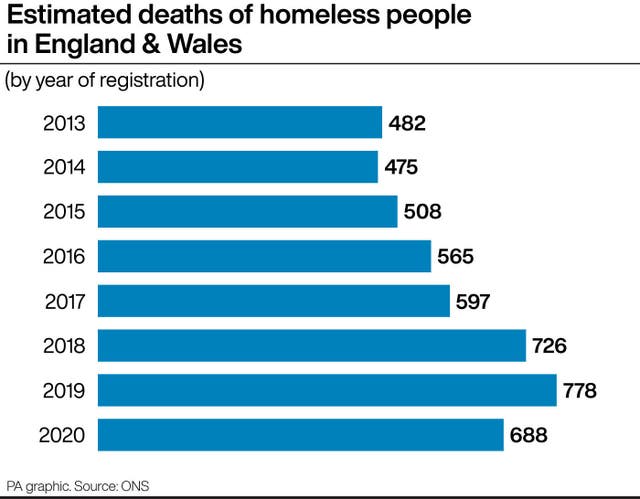Some 688 homeless deaths registered in 2020, official estimates show
The figure was lower than the previous year but the Office for National Statistics said it could be an underestimate because of the pandemic.

A “devastating” 688 deaths of homeless people were registered last year in England and Wales, including 13 involving coronavirus, according to new estimates.
It is the first time the annual number of registered deaths has fallen since 2014, the Office for National Statistics (ONS) said.
But it said the 11.6% decrease from 2019 was not statistically significant.

The ONS also said the 2020 figures may underestimate the true number of homeless deaths.
It said the Everyone In scheme, which saw thousands of homeless people rapidly brought to safety at the start of the pandemic, had made it more difficult for it to identify homeless people in its records.
People were given emergency accommodation such as hotels to keep them safe and, with no centralised record of these locations, it “has made it difficult to identify deaths of homeless people housed under this scheme”, the ONS said.
Charities said the overall fall and low number of deaths involving coronavirus was testament to Government action to bring people to safety, and that ministers must do the same this winter.
The figures include the deaths of people sleeping rough or using emergency or temporary accommodation at or around the time of death.
The total figure includes identified deaths and an estimate of the most likely number of additional death registrations not identified as concerning homeless people.
Due to delays in death registrations, about half of the deaths registered in 2020 occurred before this year, the ONS said.
Some 265 deaths (38.5% of the total) were related to drug poisoning, while deaths by suicide fell by around a third from 112 in 2019 to 74.
Deaths related to alcohol made up 12.1% of the total.
Almost nine in 10 deaths were of men and 19 deaths involved people under the age of 25.
London and the North West were the regions with the highest number of deaths registered.
Jon Sparkes, Crisis chief executive, said: “It’s simply devastating that hundreds of people were forced to spend their last days without the dignity of a place to call home.
“These deaths aren’t just numbers. Each individual was someone’s loved one whose life has been cut short and whose ambitions and dreams will now never be fulfilled.”
Rick Henderson, chief executive of Homeless Link, said 688 deaths in a year is “clearly unacceptable” and these must be investigated to prevent people dying too early in future.
He said: “In one of the richest societies in the world, this simply shouldn’t be the reality.
“But the fact that the number of deaths has officially gone down for the first time in five years and that there were so few deaths from Covid, despite the increased vulnerabilities of many who experience homelessness, is important.
“From April 2020 onwards, the Government provided anyone sleeping rough with accommodation as part of the Everyone In scheme.
“This shows the impact of providing stable accommodation, whilst treating homelessness as a health issue. We must continue to harness this approach moving forward.”
Polly Neate, chief executive of Shelter, said it is “sobering” to think that at least 688 people spent their last days homeless in a pandemic.
She said: “If it wasn’t for the Government’s Covid response to help people off the streets, even more lives would have been lost.
“The Government must step in again to keep people safe from Covid and the ravages of homelessness this winter. ”
The Department for Levelling Up, Housing and Communities said every death on the streets “is one too many”.
A spokeswoman said: “The Everyone In scheme launched during the pandemic has helped 37,000 vulnerable people, and we are also providing more than £2 billion over the next three years to tackle homelessness.
“This is on top of £800 million committed this year which includes funding for safe and warm accommodation over winter and specialist services for those with drug or alcohol issues.”





